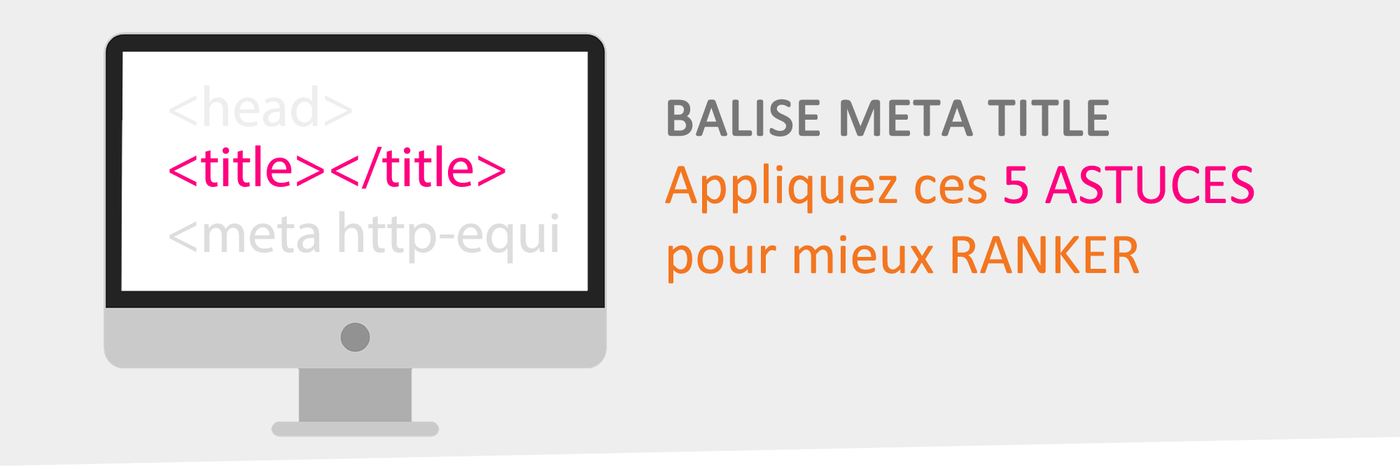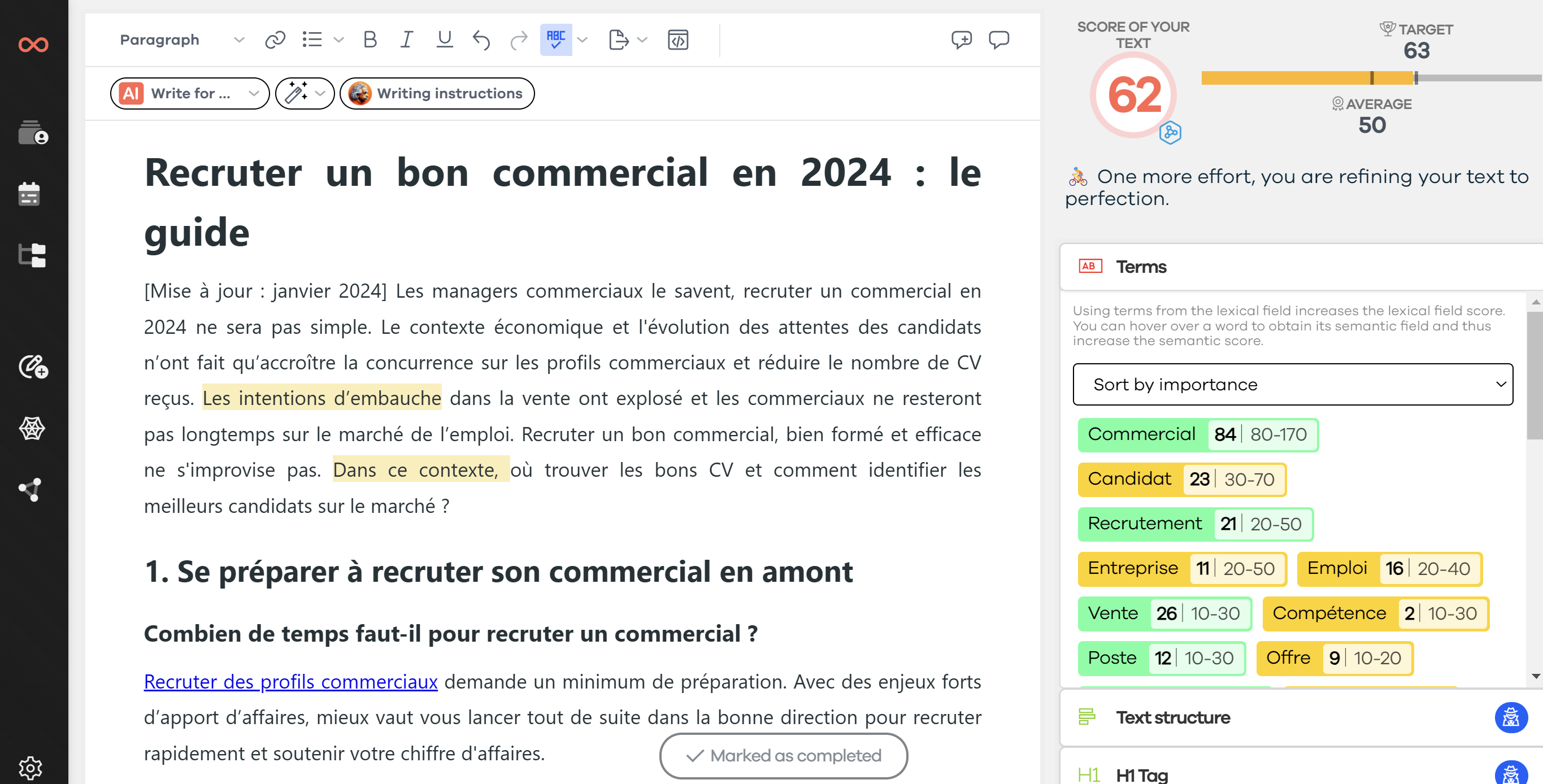Did you know that thanks to the meta tag you can increase your traffic and your ranking on Google's result pages? Indeed, in addition to providing information, the title of your page is displayed in the SERP, which
Many of you regularly ask me if the HTML tag
is still as important today for organic SEO? Should I optimize the semantics of my title tag? Recent studies tend to show that there is <strong>a link between optimized title tags</strong> <strong>and a</strong> <strong>significant and measurable increase in ranking</strong>. The second aspect of the meta tag
<p></p><title>, which we tend to forget, is the <strong>CTR (click-through rate)</strong>: the famous <strong>click rate</strong>. How is the CTR calculated? Here's how to <strong>calculate the CTR</strong>: number of clicks on the result divided by the number of impressions of the result.
<p>A better click-through rate can significantly <strong>increase your traffic</strong>! Moreover, it can improve your <strong>positioning in the Google SERP</strong> (indirectly). Indeed, Google Rankbrain studies user behavior in the SERPs, something to ponder... In any case, by only modifying the first thing the visitor sees, you therefore win on both fronts.</p>
<p><strong>A better click-through rate = more visitors = better positioning</strong></p>
<p>To increase the CTR, I offer you some tips to experiment with. Remember that SEO is not an exact science and a recommendation may work for your case, but not necessarily for a colleague.</p>
<p>## 🚀 Quick read: what you will learn about the title tag</p>
<p>In this article, we give you the 5 <strong>best tips to optimize your title</strong> displayed on Google.</p>
<p>1. <strong>Adequate length</strong>: your meta title should be readable in its entirety.<br />
2. <strong>A number</strong>: conveys precise information about what will be conveyed in the article.<br />
3. <strong>A date</strong>: demonstrates the timeliness of the content.<br />
4. <strong>A call to action</strong>: asserts the possible results from reading your page.<br />
5. <strong>A question</strong>: to best answer the search intent.</p>
<div class="well well xs">
<strong>To learn effective optimization methods on these 5 points, just read the rest of this article.</strong>
</div>
<p>## <strong>1️⃣</strong> Length</p>
<p>This is one of the unavoidable elements in SEO, the <strong>length of the tag</strong></p>
<p></p><title>. During audits, tags are often too short ("tesla") or too, too, too long trying to include as many keywords as possible ("Gold credit card helps you stagger your expenses, your credits and pay for your purchases in three installments"). Mmmh! Let's analyze these <strong>two practices</strong>. The short title: "tesla", it's a far too broad query. <em>Tesla</em> could be anything. It's hard to know what it's about. The same goes for the search engine. Is it about the car? Is it about the inventor?
<p><strong>What is the maximum length of a title tag? 50-60 characters</strong> — Make sure the length of the title tag does not exceed 50 to 60 characters.</p>
<p><strong>What is the minimum length of a title tag?</strong> There is no minimum length, use at least 3 words to create the best hook sentence.</p>
<p><strong>Use the main keyword</strong> — Find the keyword that your visitors actually use for your page and put it in the tag.</p>
<p><strong>Use a tool to recommend/simulate the length of the tag</strong>. If you have a doubt, there are tools that allow you to simulate the length of the</p>
<p></p><title> as well as the meta description.<br /><div class="well well xs">
<strong>You can use this tool to find out if your title will be displayed in full in Google's SERP: <a rel="noopener noreferrer" href="http://www.referencement.com/simulateur-serp-pixels/">http://www.referencement.com/simulateur-serp-pixels/</a></strong>
</div>
<p>## <strong>2️⃣</strong> Numbers</p>
<p>Numbers in a title tag stand out. Here are some examples: <strong>"5 unmistakable signs of SEO fans"</strong> or <strong>"How to optimize your performance by 45%...".</strong></p>
<p>When you see title tags with numbers in the SERPs, the results tend to get a higher click-through rate. This works because of <strong>cognitive biases: distinction and specificity</strong>. Our brain is trained to find things that stand out from the mass.</p>
<p>When the user reads the Google search results page, they are confronted with a lot of information. The brain will try to simplify the analysis by clinging to <strong>differentiating elements</strong>. Numbers also have the power to be <strong>specific</strong> (for example: "the 5 colors to use for..."), specificity reassures the reader, it simplifies the analysis (and their thinking).</p>
<p>## <strong>3️⃣</strong> Dates</p>
<p>As in the point above, use the magic of numbers. These are</p>
<p></p><title> like <strong>"The best robot vacuums in 2017"</strong> or even more specific, <strong>"Comparative September 2017 of Open Source ERP and CRM."</strong> There are ways to find dates in your keyword research. The key here is to search for previous years. So, if I was looking for this year, I would search for "robot vacuums 2016" or "erp crm 2016".
<p>## <strong>4️⃣</strong> Call to action</p>
<p>Use action verbs, they really help users to click. The reader must <strong>know what to expect when they click</strong>. The offer must therefore be explicit, no bad surprises. Be imperative!</p>
<p><strong>Action verbs</strong>: <strong>buy, try, find, listen, watch, learn</strong> and <strong>access</strong>. When you use these verbs, they give the user a precise indication of the nature of the content and the action they can perform.</p>
<p>## <strong>5️⃣</strong> Questions</p>
<p>Questions are <strong>powerful tips to use in your title tags</strong>. Your topic may be "Red panda food", a title written in the form of a question significantly increases your click-through rate: <strong>"What do Red Pandas eat?"</strong>. You create curiosity that encourages the user to click.</p>
<p>## <strong>❓</strong> Where to start?</p>
<p>Identify pages with a <strong>low CTR</strong>. To increase the number of visits, you need to work on your CTR, a CTR below 5% is a bad click-through rate. Start the analysis with the <a rel="noopener noreferrer" href="https://www.google.com/webmasters/tools/">Google Search Console</a> and identify CTRs below 5%. Go to "Search Traffic"/"Search Analysis", check the impressions, CTR, positions boxes. You will get the following table:</p>
<div class="media media-element-container media-wysiwyg media-wysiwyg-align-center">
<div id="file-38" class="file file-image file-image-jpeg">
<div class="content">
<img alt="Google Search Console, CTR optimization" class="media-element file-wysiwyg img-responsive b-lazy" data-delta="1" typeof="foaf:Image" width="1027" height="739" data-src="https://www.seoquantum.com/sites/default/files/search_console_optimisation_ctr.jpg" src="data:image/gif;base64,R0lGODlhAQABAAAAACH5BAEKAAEALAAAAAABAAEAAAICTAEAOw==" /></div>
</div>
</div>
<p>These are 5 effective tips that I wanted to share with you. And you, <strong>do you have other tips to optimize your <title> tag and thus boost your CTR and your Google ranking?
## 🎁 BONUS
Some ideas and examples of meta tag structure that you can use, modify... it's up to you to play.
### Call to action + keyword + Incentive
- Buy women's pants, up to 30% off
### Call to action + Keyword + Variant + Incentive
- Buy black women's pants up to 30% off
### Call to action + Benefit + keyword + variant + incentive
- Buy and save on red women's pants up to 30% off
### Call to action + GeoLocation + Product or Service + Time constraint + Incentive
- Order from Lyon Pizza, XXL pizza - today, free drink
### Sub-category + GeoLocation + Incentive or advantage
- Emergency water leak repair in Lyon - Intervention in 30 min
### Advantage + Incentive + Service + Time constraint + Call to action
- Save up to 30% on Grandma's pizza today 04 74 12 12 12
## ⚠️ TitleGate: Google changes the proposed titles
Since 2021, SEOs have noticed that title tags are no longer displayed as often as in the past. Indeed, the search engine now takes the liberty of changing this title if it considers that it does not sufficiently answer the query.
As a result, many thought it was pointless to continue to propose a metatitle since it was no longer displayed. They are partially right! It is true that, as it is no longer necessarily presented in the SERP, optimizing this tag is no longer necessarily effective for improving your CTR.
However, if you do not take care of this information, you miss a good opportunity to convey an important message to Google! Because know this, it is still a hot zone in SEO that helps improve your ranking.
However, to ensure you continue to have a striking title in the SERP, you should take care of your "on page" title, namely the H1 tag. Indeed, if the title is no longer prioritized on the results page, it is often replaced by the title of your content.
## 🙏 Sources used to write this article
- https://developers.google.com/search/blog/2021/08/update-to-generating-page-titles
- https://developers.google.com/search/docs/appearance/title-link
- https://developers.google.com/search/blog/2021/09/more-info-about-titles

